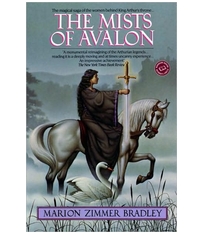This review was submitted by Patricia Meredith, thanks Pat!
There are as many books that “re-write” the story of Camelot and take a “new spin” on Arthurian legend as there are fish in the sea. “The Mists of Avalon” however, is a different retelling of the legend; the focus of the tale is shifted, from the Christian male perspective, to that of the old religion led by women and centered in the Isle of Avalon.
The tale is told from the points of view of Morgaine, (Morgana Le Fey), Priestess of Avalon and Gwenhwyfar, (Gwynivere),princess and future queen of Camelot.
Morgana Le Fey is normally portrayed as the evil antagonist to Arthur and the round table. Here she is Morgaine, a Druid High Priestess, who is struggling to keep her dying religion alive against the growth of Christianity. She struggles with her dual roles as wise-woman and priestess, sister, mother, lover and wife in a growing Christian society.
Gwenhyfar is not the perfect yet tragic heroine we all know, but a person with insecurities and neurotic tendencies. Her religious fanaticism is accompanied by her doubts of God and her insecurities as a woman. At first reading, Gwenhyfar is quite a disagreeable character but one realizes that she is in truth just as complex as Morgaine and that she is actually a woman of the times.The reader also views other well-known female characters from a different vantage point, including Igraine, Morgaine’s and Arthur’s mother.
This novel has often been criticized as being feminist and anti-Christian (as if they go hand in hand!) when in truth the novel portrays a time of extreme upheaval when Christianity was settling into England and struggling for dominance over the goddess/female-centered Druidic religion. One must remember that Bradley is not portraying the Christianity of today, but as it existed during the age of the inquisition and when women were being burned at the stake for their herbal lore. As Morgaine realizes; “I came to see that my quarrel was never with the Christ, but with his foolish and narrow priests who mistook their narrowness for his.”
King Arthur is still the noble, ahead-of-his-time man we always loved but it is not Guinevere or her affair that destroys him, instead he is a man destroyed by the small-mindedness of humankind (both men and women).
I really loved this story but did feel at times that Ms. Bradley bit off a bit more than she could chew with the large scope of what she was attempting. However all in all it gave me a perspective on the Arthurian legend that will stay with me forever and I found it to be a mystical and magical read.
Pat, I have to agree with you, I have also read this book and found it to be a fascinating and absorbing read.
